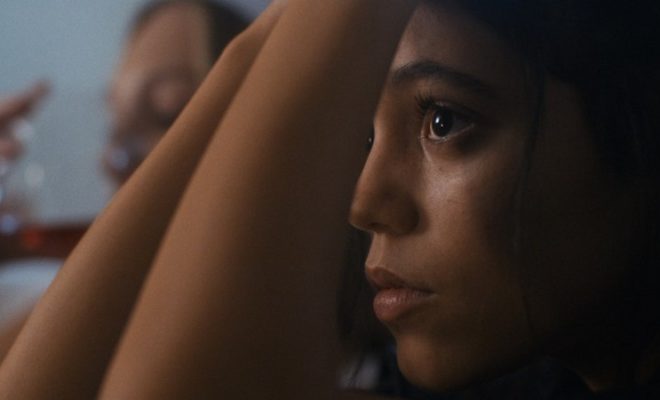
Movie Reviews
The Fallout
By: Maggie Stankiewicz
In her directorial debut, Megan Park explores the aftermath of a violent tragedy in her new film The Fallout. Told from the perspective of Vada (Jenna Ortega), The Fallout is a coming-of-age tale that doesn’t shy away from the ugliness of the world, placing it against a backdrop of powerful friendships, love, grief, trauma and all that it takes to simply cope with challenges we face at every stage of life. It isn’t a comfortable story to tell, but that’s the point. It is a salient representation of the anxiety, trauma and unprecedented challenges that today’s youth face in America. The result is a harrowing, maddening, grounded film steeped in social commentary.
Writer-director Megan Park has spent a bulk of her career living in the headspace of teenagers, landing roles in beloved properties like “The Secret Life of the American Teenager” and Charlie Bartlett – and it shows. As a writer, Park is adept at capturing the ever-evolving vernacular of today’s teens and illustrating the many ways in which they express themselves to family, friends and strangers. This seemingly effortless understanding of her subject matter translates well into her directing style as well, pulling stellar performances from both her established and rising superstar cast.
The central character of our story, Vada, is quickly established as a quick-witted, independent spirit with a soft spot for her younger sister Amelia (Lumi Pollack). One day at school, after giving her sister a first-menstruation pep talk, Vada meets Mia (Maddie Ziegler) in the bathroom. Before they can exchange more than a few words, their world collapses around them. Gunshots echo through the hallway and they scramble towards an empty stall together. In several moments that serve as a masterclass in tension building, the bathroom door flies open. Quinton (Niles Fitch) runs inside and crawls into the stall with the girls, covered in his own brother’s blood.
The gunshots continue until authorities put a stop to the massacre off-screen. The focus never pulls from our central characters. The killer doesn’t matter. This is not his story – it is theirs. The film recognizes this, as the media so often fails to, and never loses its loyalty to the victims. The rest of the film focuses on Vada, Mia and Quinton’s journeys through trauma, grief, growth and shameless regression. The way each character struggles and heals are distinct, carefully crafted by the performers under Park’s direction.
The Fallout is careful to address each facet of Vada’s life and how her behavior changes as she struggles to cope. Her parents, Carlos and Patricia, played by the consistently endearing John Ortiz and Julie Bowen, are loving– but not without their flaws. These family ties are juxtaposed against Mia’s absentee parents and Quinton’s fractured family unit. The relationships in the film are among its most powerful elements. There is diversity in the dynamics of every character interaction.
The tenets of your classic teen dramas are also explored – namely drugs and sexuality, though these don’t fit into the narrative as seamlessly as others. There are scenes between Vada and Mia that feel inflated and tokenized, but they do generate additional conflict and room for character growth. It can be forgiven within the overall context of the film, but feels derivative when compared to the staunch originality of the film surrounding it.
Coming-of-age tales often depict the universal struggles of growing up and moving on. In this way, The Fallout is a dismal portrait of life for the American teenager, where gun violence has become so commonplace, that it doesn’t feel like an unrealistic evolution of a well-established subgenre. This movie is one with something to say and its message is incendiary in all the right ways. It will scare you. It will push you. And, hopefully, it will help those previously unable to understand the real horrors of growing up.





You must be logged in to post a comment Login